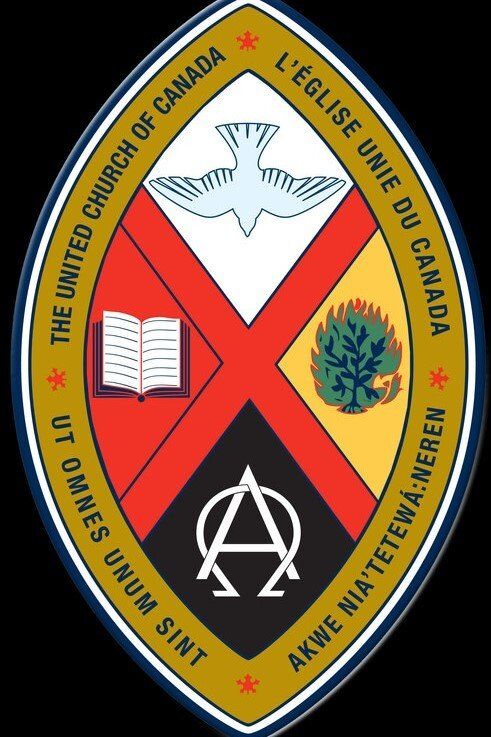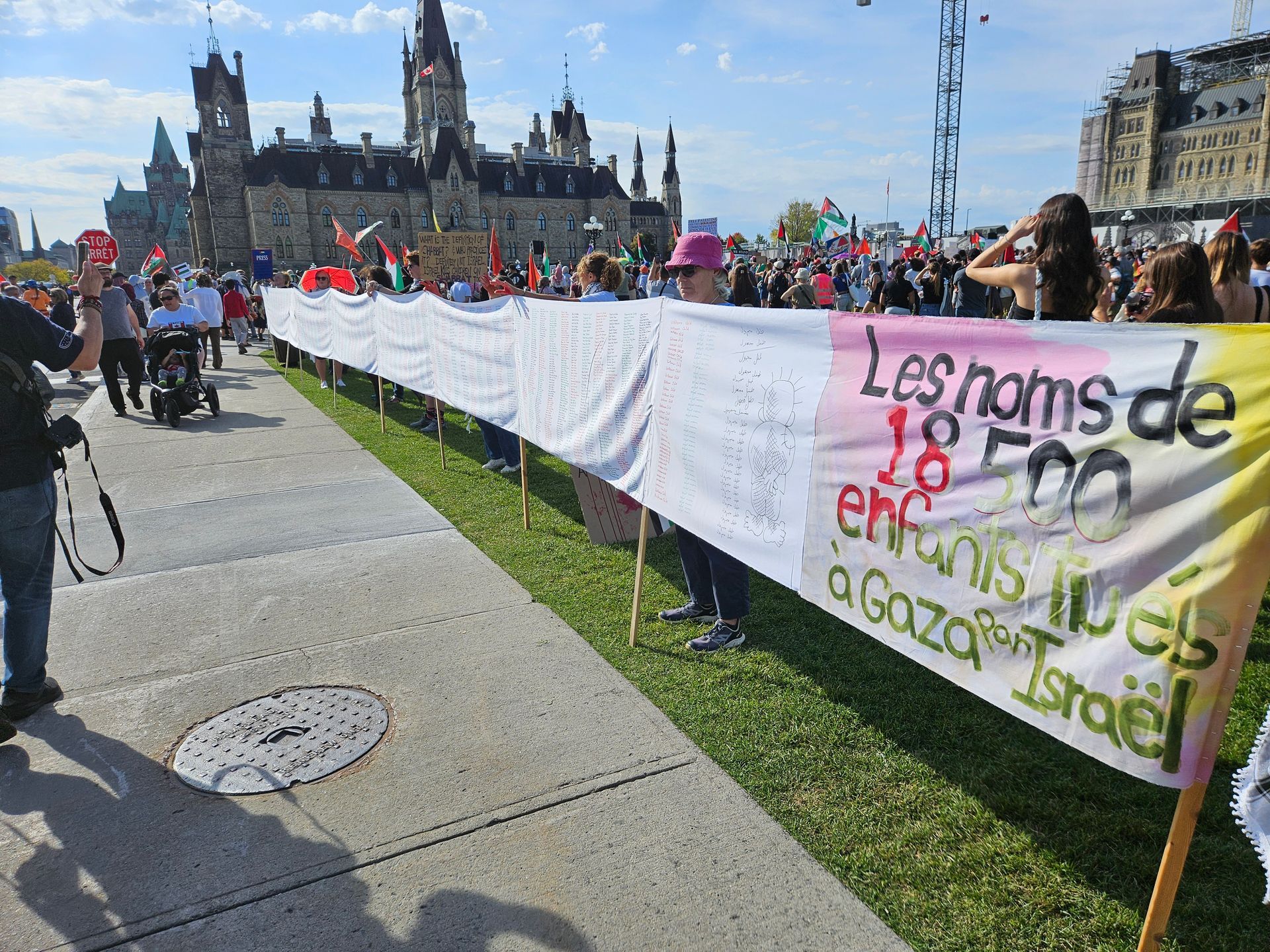The Way toward "Reconciliation"

"...changing its crest to reflect the participation and contribution of Indigenous peoples since Union" - the colours of the four directions and the motto "ut omnes unum sint" ("that all may be one") supplemented in Mohawk with "Akwe Nia'Tetewá:neren" ("All my relations")
Ed. Foreword:
This "guest post" was written by Rev. Dr. Jamie Scott for the worship service on National Indigenous Peoples Day held on Sunday, June 19th, 2022 at First United Church, Westboro in Ottawa. It was part of a three part witness involving two other members of the congregation all reflecting on the necessary and challenging journey towards reconciliation between colonial settler peoples and the Indigenous peoples of Canada. Thanks to Jamie for sharing these reflections and faith convictions from his vast experience of guiding the United Church on paths leading towards justice- and friendship-based reconciliation with Canada's Indigenous Peoples.
The prayer "Remembering the Children" concluding this part of the service is also published here. The Rev. Lillian Roberts composed the prayer for the 2008 Church and Aboriginal Leaders' Tour in preparation for the Truth & Reconciliation Commission. H.O.
~ ~ ~ ~ ~ ~~ ~ ~ ~ ~ ~ ~ ~ ~ ~
Listening to Wisdom from the Ancestors in the Faith
Scripture: Matthew 5:23-24 (NRSV)
“So when you are offering your gift at the altar, if you remember that your brother or sister has something against you, leave your gift there before the altar and go; first be reconciled to your brother or sister, and then come and offer your gift.”
Reflection on the Word
This teaching about reconciliation, attributed to Jesus, guided my 12 years as the
national staff for the United Church responding to the devastating impact of the
Indian residential schools system, a system in which we were complicit.
It is a succinct but rich text about what to do when relationships have been broken.
For me, this teaching offers four key insights to us as individuals and to the church as
a whole. The first is that our spiritual life is not separate from the rest of our life.
When you worship, Jesus says, think about your life. If you know that things are
not right with others, go and make them right. Spiritual practice requires reflection
about the health of our relationships with other people. In that reflection, we may
recognize that some relationships are broken, and need repair.
The second insight is that recognizing that a relationship is broken requires a
response. It requires accountability, “stepping up to the plate”, so to speak. We
are called to be pro-active, to take the initiative to own our responsibility by
engaging with the other party. Simply remembering, or even feeling regret, is not
reconciliation. “Leave your gift there before the altar and go!”
Thirdly, we are called to make things right. “Be reconciled!” The neighbour who
has been harmed must be attended to, must have a voice in what is required to
make things right. Perhaps this will mean a change in our attitude, or in our
perceptions, or in our behaviour. It often means repairing the damage, making
reparations. What does this look like for us as a church?
The fourth insight is that reconciliation is a spiritual act. The health of our spirit is
interdependent with the health of our relationships with others. Indigenous
spirituality speaks about balance, being “in balance” or “out of balance” with the
land, with oneself, with others and with the Creator. If we are “out of balance”
with any, we are out of balance with all of them. Making things right, coming back
into balance with others is a spiritual act of regaining balance with the Creator.
It’s been seven years since the release of the Truth and Reconciliation Commission’s
Final Report which described the wrongs done to Indigenous peoples by settlers
and colonization as a mountain, and offered 94 Calls to Action as a roadmap to
accountability, to “making things right”. The Calls addressed not only the legacy
of residential schools but also a wide spectrum of injustices that continue to impact
the lives of Indigenous peoples. It challenged all Canadians to climb the mountain.
Remembering
The United Church began to “remember” that Indigenous people had
“something against us” in 1984 when Elder Alberta Billy (who sadly passed away
this past week) stood at a General Council meeting and called on the Church to apologize
for how it had treated Native people. The Church acknowledged the harm in an
Apology to First Nations Peoples in 1986 which said, in part, “(W)e imposed our
civilization as a condition of accepting the gospel of Christ. We tried to make you
be like us and in doing so we helped to destroy the vision that made you what you
were.”
Wise Elders received the Apology but did not accept it, preferring to wait
until the Church lived out its’ words in action. In 1998, the United Church offered
a second apology, specifically to Former Students of United Church Indian
Residential Schools, their families and communities, for its role in operating thirteen
schools.
Canadians, as a nation, began to “remember” the history and impacts of Indian
residential schools in 1990 when former National Chief Phil Fontaine disclosed on
national media that he had been physically and sexually abused at the residential
school he attended. Other survivors came forward with horrendous stories of their
experiences at government-mandated, church-run schools which, for over 120
years until 1996, tried to assimilate Indigenous children into settler culture. It’s a
history most Canadians were not taught in our educational system.
As the truth came out, some tried to claim that the abuses experienced by some
150,000 children who were taken from their families and forced to attend the
schools were the actions of “a few bad apples” among the staff. But as survivors
continued to speak up, through individual lawsuits, a class action and the Truth
and Reconciliation process, the churches, the government and the country as a
whole “remembered” that a systemic harm had been perpetrated on Indigenous
children, their families and communities. Prime Minister Harper “remembered”
this in the 2007 national Apology, saying that the residential school “system” was
based on the assumption that “Aboriginal cultures and spiritual beliefs were
inferior and unequal”. It was “designed to remove and isolate children from the
influence of their homes, families, traditions and cultures, and to assimilate them
into the dominant culture”, effectively “to kill the Indian in the child”. We all
heard the truth that the Indian residential school system was an intentional and
systemic attempt to eradicate a people by our churches and government.
In the years since, Canadians continue the process of “remembering” what our
sisters and brothers have against us as we confront the horror of thousands of
deaths at the schools and hundreds of unmarked burial sites on the grounds of the
schools – children who died far from home, buried without recognition and often
without their parents being informed of what had happened to them.
Our “remembering” has also expanded to recognize that the residential school
system was only one colonial tool among many to disempower, dispossess and
assimilate Indigenous peoples. The imposition of the Indian Act, the outlawing of
Indigenous cultural and spiritual practice, the impact of the 1960s Scoop removing
Indigenous children from their families to be raised in non-Indigenous homes, the
abrogation of treaties, the underfunding of the health and social needs of Indigenous
communities, and racism continue to inflict damage. The mountain of harm is
huge.
Climbing the Mountain
The United Church as an institution has begun to climb the path to reconciliation.
It put action behind the words of it's Apologies by settling claims quickly and
fairly, submitting all of its records to the Truth and Reconciliation Commission,
increasing its funding for Indigenous ministries, changing its crest to reflect the
participation and contribution of Indigenous peoples since Union, repudiating the
Doctrine of Discovery and embracing the UN Declaration on the Rights of
Indigenous Peoples, and last year setting aside $3 million dollars to support the
work to locate of unmarked burial sites and the identification of unnamed children.
This is a start but we still have a long way to go.
[Reflection continued as another member of the congregation described her journey of growing awareness and action to "climb the mountain", and another sharing action ways leading toward "reconciliation".]
The Prayer: Remembering the Children
God of our Ancestors,
who holds the spirits of our grandmothers and grandfathers
and the spirits of our grandchildren,
Remembering the Children,
we now pledge ourselves to speak the Truth,
and with our hearts and our souls
to act upon the Truth we have heard
of the injustices lived,
of the sufferings inflicted,
of the tears cried,
of the misguided intentions imposed,
and of the power of prejudice and racism
which were allowed to smother the sounds and laughter of
the forgotten children.
Hear our cries of lament
for what was allowed to happen, and for what will never be.
In speaking and hearing and acting upon the Truth
may we as individuals and as a nation
meet the hope of a new beginning.
Great Creator God
who desires that all creation live in harmony and peace,
Remembering the Children
we dare to dream of a Path of Reconciliation
where apology from the heart leads to healing of the heart
and the chance of restoring the circle,
where justice walks with all,
where respect leads to true partnership,
where the power to change comes from each heart.
Hear our prayer of hope,
and guide this country of Canada
on a new and different path.
Amen
(attribution: Rev. Lillian Roberts)
~ ~ ~ ~ ~ ~ ~ ~ ~ ~ ~ ~ ~ ~ ~ ~ ~ ~ ~
Ed. Postword:
This post is one of more than a dozen Pilgrim Praxis reflections on the Canadian experience of colonialism and settler domination of northern Turtle Island - politically, religiously, economically, culturally, and territorially. Browse in www.minister.ca for other reflections, including the work of the 1% Fund Action Group proposing a substantial and tangible sign of government and societal desire for a new way of being in relationship with Indigenous Peoples - the path toward "Reconciliation". A second iteration of the Action Group's Proposal will soon be published.

